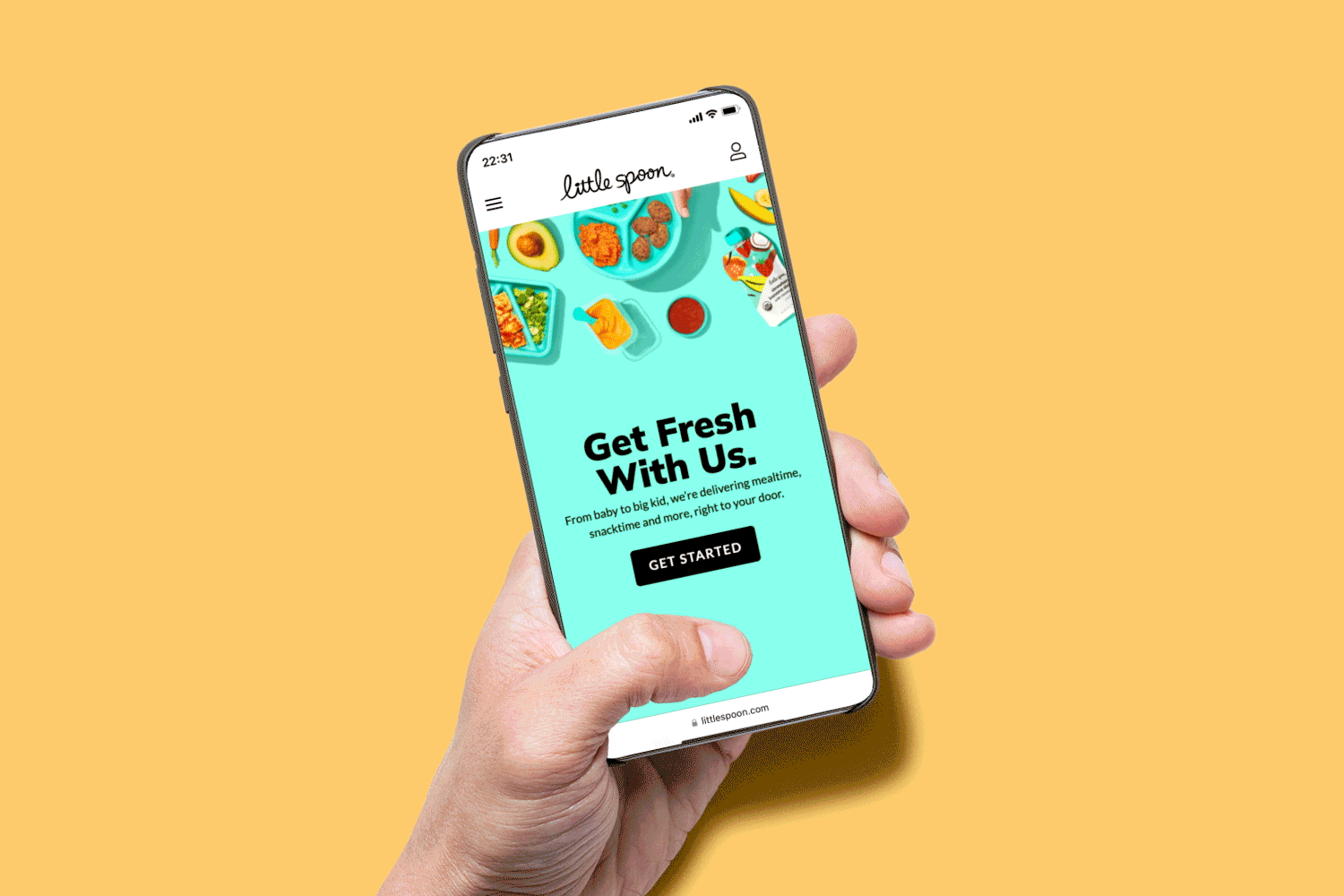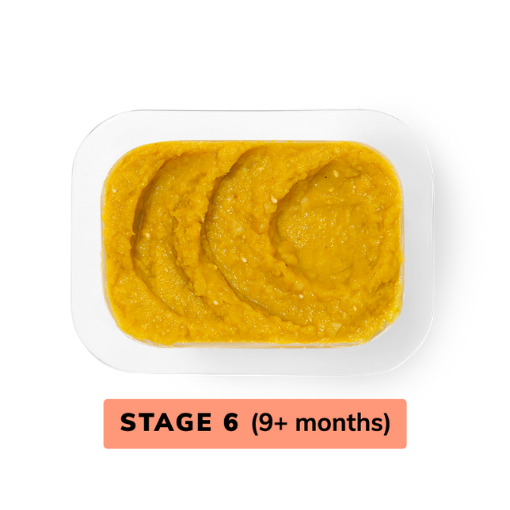


Red Lentil + Chickpea Curry



Key Ingredients
Butternut squash, Kale, Turmeric, Cumin
Key Allergens
None
Little Spoon is the first and only brand to set clear standards for safety and test every batch of our baby food.
Our promise? We test our baby food for heavy metals, pesticides, glyphosate, and plasticizers. And if our results don't meet our standards - we won't sell it. Peace of mind for you and the best for your baby.
This Babyblend’s Results
Our testing standards are aligned with the highly trusted European Union (EU) standard.
At Little Spoon, we use the European Union (EU) standard for heavy metals to ensure all of our Babyblends fall at or below set limits. Peace of mind with every serving.
Arsenic
Result: Passed
EU Standard: <20 ppb
Cadmium
Result: Passed
EU Standard: <40 ppb
Lead
Result: Passed
EU Standard: <20 ppb
Mercury
Result: Passed
EU Standard: No limit set
Our Standard: <10 ppb
What is PPB?
What is PPB?
PPB = parts per billion. Think of parts per billion as 1 drop of water in an Olympic sized swimming pool.
Finished goods test results must fall at or below the Little Spoon limit or we will not sell these products.
We source certified organic ingredients free of synthetic pesticides from the start, and validate with a test for 500+ pesticides for your baby's safety.
Glyphosate
Result: Passed
Our Standard: <100 ppb
Pesticides
Result: Passed
Our Standard: <50 ppb
What is PPB?
What is PPB?
PPB = parts per billion. Think of parts per billion as 1 drop of water in an Olympic sized swimming pool.
Finished goods test results must fall at or below the Little Spoon limit or we will not sell these products.
Plasticizers are common chemicals found in plastics. While our packaging is BPA and BPS-free, our lab tests for their presence to ensure our strict internal standard is met.
BPA
Result: Passed
Our Standard: <50 ppb
BPS
Result: Passed
Our Standard: <50 ppb
What is PPB?
What is PPB?
PPB = parts per billion. Think of parts per billion as 1 drop of water in an Olympic sized swimming pool.
Finished goods test results must fall at or below the Little Spoon limit or we will not sell these products.
Did you know?
The US does not have federal regulations in place for limiting the level of chemical contaminants in baby food. In fact, companies are not even required to test their products. That’s why we took matters into our own hands.

Meal + snacktime made as easy as 1, 2, 3.
Meal + snacktime made easy
1
Sign up.
Tell us what products you want to start with and how many. Don't worry, you can always make changes!
2
Select your meals + snacks.
Choose what you want in your first box and shop all our products.
3
Sit back and relax.
You're all set! We'll prep your order + deliver it to your door. Pause, edit, skip or cancel anytime. It's that easy.
Your questions, answered.
Here to make keeping your kid healthy easy.
- At Little Spoon, we've chosen to set strict safety standards for pesticides, glyphosate, and plasticizers, while utilizing the European Union testing limits for heavy metals. Our program offers comprehensive safety guidelines that go beyond current U.S. standards, which unfortunately lack regulations for chemical contaminants in baby food. Little Spoon tests for over 500 toxins and contaminants in our toxins and contaminants in our Babyblends, ensuring that no product is sold unless all testing limits are met. All of our Babyblends are organic, non-GMO, kosher, and vegan, crafted with your child's safety in mind. When it comes to heavy metals, we rigorously test every batch of our products at an accredited third-party lab to ensure they meet the European Union standards for heavy metals. We follow the EU's guidelines by limiting lead and arsenic to 20 parts per billion (ppb) or less, and cadmium to 40 ppb or less. Although the EU doesn’t set a specific limit for mercury, we’ve established our own threshold at 10 ppb or less. To put this in perspective, 1 part per billion (ppb) is equivalent to a single drop of water in an Olympic-sized swimming pool. While heavy metals are naturally present in the environment, we are committed to minimizing exposure through rigorous testing and careful sourcing.Although the EU doesn’t currently set limits for BPA migration into baby food, our lab’s minimum detection levels meet the EU’s limits for BPA in food. Regarding BPS, the EU has yet to establish specific limits for its residue in food products. Our Babyblends feature only USDA-certified organic ingredients, meaning no synthetic pesticides are used in their cultivation. The EU has set maximum pesticide limits at 10 ppb, but U.S. agricultural standards are not as strict. For this reason, our lab's minimum detection limits for pesticides are not as low at this time.At Little Spoon, we are committed to leading the way in transparency and safety, openly sharing our testing limits, Babyblend test results on each product page, and our safety standards with the public. We want parents to have peace of mind knowing that ourBabyblends meet the strict standards we've set for heavy metals and other contaminants. We're proud to raise the bar in the baby food industry, ensuring families have access to safe, nutritious, and trustworthy food options.
- We source our certified organic ingredients from trusted farms and suppliers who adhere to sustainable and safe farming practices. Every ingredient is fully traceable to its source, ensuring transparency and accountability at every step. We rigorously test to ensure ourBabyblends meet our strict safety standards, so you can feel confident that what you're feeding your little one is both safe and of the highest quality.You can check out many of our farm partners on Our Standards page.
- At Little Spoon, we’ve chosen to align our safety standards with California’s Proposition 65 and the strict regulations set by the EU, which are among the toughest in the world. These regulations offer comprehensive safety guidelines that go beyond current U.S. standards. We rigorously test every batch of our products for heavy metals at certified third-party labs, and no product is sold if it fails to meet our strict heavy metal standards.Regarding the Baby Food Safety Act of 2021, it’s important to note that this bill never made it out of committee. The proposed limits for heavy metals are extremely low and it is unlikely for the current U.S. farming and agricultural industry to meet such levels overnight. The Baby Food Safety Act of 2023, if passed, would require the government to establish heavy metal limits by a set deadline, but those limits wouldn’t be finalized until 2027. This means we are likely still several years away from having codified regulations for heavy metals in baby food, and we don't think that's good enough.Rather than wait for regulations to catch up, we’ve chosen to take matters into our own hands and approach by aligning with the EU’s already established limits and California’s Proposition 65, both of which are highly regarded for their strict safety measures. This way, we’re already sticking to some of the toughest safety standards for baby food in the world.Our goal is to lead the way in transparency and safety by sharing our limits and standards openly, so parents can feel confident that every batch we send out is well below the strict levels we’ve set for heavy metals. We’ve worked with top experts to develop these safety standards, and we’re proud to be raising the bar for the baby food industry.
- Typically, your baby is ready to start solids between 4-6 months. We always recommend talking to your pediatrician to discuss your baby’s needs when it comes to starting solids. There are a few telltale signs that your baby may be ready:
- Sitting up with little to no support
- Strong head control
- Has outgrown their tongue thrust reflex
- Is starting to show interest in food and what those around are eating
- Much of the baby food on grocery store shelves is heavily processed using extreme heat to extend shelf life for years, often including preservatives, additives, and fortifiers. In the past few years, a congressional report raised concerns about the quality of popular baby food brands, highlighting the presence of heavy metals and lack of traceability. Not cool, and definitely not the quality nutrition we want for our kids.At Little Spoon, we’ve also aligned our safety standards with the EU’s best-in-class regulations, which are among the toughest in the world. This means our products are held to strict limits for over 500 toxins and contaminants, including heavy metals like lead, arsenic, and cadmium. We’ve gone even further by setting our own limit for mercury at 10 parts per billion (ppb), ensuring we adhere to some of the most rigorous safety measures out there.All of our Babyblends are USDA Certified Organic, non-GMO, and made without rice (which is high in organic and inorganic arsenic), fortifiers, or anything artificial. We focus on providing a wide variety to diversify your little one’s diet, using only the best ingredients sourced from trusted suppliers and farmers. We’ve partnered with the Clean Label Project, an independent, third-party organization that rigorously tests for over 100 contaminants, including heavy metals and other toxins.We use an FDA-approved food safety technique called cold-pressure processing (HPP) instead of heat pasteurization to ensure our Babyblends are safe while preserving their nutrients. This keeps them fresh in your fridge for 14 days or in the freezer for up to 2 months.Our Babyblends are developed with the guidance of pediatricians and leading experts to fit every eating stage, from first bites and single-ingredient blends to advanced purees. They’re a great companion to baby-led weaning, with our complex blends offering thicker textures as your baby grows.
- Little Spoon Babyblendscan be stored in the fridge for up to 14 days, or in your freezer for up to 2 months.Our purees can be eaten at a range of temperatures, whatever works best for your baby! To warm up your blend, we recommend putting the container in a shallow bowl of warm water and stirring until heated. If you wish to microwave, simply pour the puree into a microwave safe dish and stir to ensure it's been evenly warmed.
- You bet! After you sign-up you have full control of your little one’s menu. If you have questions about what blends are best for your baby, you can reach out to us at [email protected] or use the chat feature to talk with one of our Child Nutrition certified Care Team members.
- Yes! We love that some parents and littles want to take a more tiny hands-on approach on their journey into solids and Babyblends offer a great compatible option for nutrition and development alongside BLW. Baby-led weaning has become a popular way to introduce babies to whole foods. Typically baby-led weaning begins with larger pieces and around 8+ months, moves to smaller pieces. Our Biteables line is perfect for babies transitioning to table foods—whether puree-fed or baby-led weaning! As with anything having to do with your mini, we recommend discussing BLW with your pediatrician to see if it's the right fit for your family.
- We know how frustrating it can be to see your baby refusing food. But be patient before you give up on the food - the average baby needs to taste a food up to 15 times before recognizing it and developing a taste for it.It’s all part of palate training and perfectly normal. Pro tip? Try mixing a new flavor in with a familiar one to help ease your baby into trying new things! You can read more tips here.
- All of our Babyblends are kosher Pareve (no dairy or meat) and OU Kosher certified, the world’s largest and most recognized kosher certification agency.
